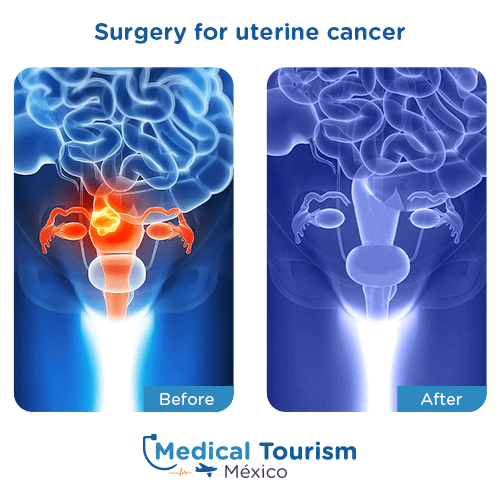The most reliable doctors in Mexico
Uterine cancer - Hysterectomy information and locations in Mexico
Uterine cancer or endometrial cancer starts on cells that form the endometrium. This type of
cancer is often detected in the early stages as it causes and abnormal bleeding.
A hysterectomy is a surgery performed to remove a woman’s uterus after cancerous growths have
been detected. General or regional anesthesia can be employed. During the procedure, the uterus
is removed along with the fallopian tubes and ovaries. After a hysterectomy, you can’t become
pregnant and you’ll start menopause. Some patients might need chemotherapy or radiation therapy.
Surgical approaches to hysterectomy
Abdominal hysterectomy
An incision is made on the stomach to have access to the uterus. This is the most common
procedure to treat uterine cancer.
Vaginal hysterectomy
A small incision is made on the top of the vagina to remove the uterus. This method is
less invasive and leads to a shorter hospital stay.
Laparoscopic hysterectomy
This is the least invasive method; 3 to 6 small cuts are made to the belly to insert the
laparoscope and the special tools needed to remove the uterus.
Get hysterectomy surgery with the best oncologists in Mexico!
Benefits
Can relieve pain
Lower risk of side effects
Improves the quality of life
Reduces the risk of recurrence
Lower risk of side effects
Improves the quality of life
Reduces the risk of recurrence
Uterine cancer
Procedure:
1 hr.
Hospital stay: 1 - 3 hrs.
Cleared to fly: 5 - 7 days
Hospital stay: 1 - 3 hrs.
Cleared to fly: 5 - 7 days
After surgery
Out of town patients’ follow-ups are scheduled with the surgical oncologist after 7-15 days from uterine cancer
surgery. Patients are clear for flying after 5 -7 days from uterine cancer surgery.
Note: Follow-ups can be arranged as face-to-face or virtually. If needed, you can go to your primary care physician to remove sutures or get medication adjustments.
As an Amazon Associate, we earn from qualifying purchases.
Take a look at one of our medical tourism essentials for oncology surgery.
Take a look at one of our medical tourism essentials for oncology surgery.
Before and after images
View additional images for this procedure.

View more


Locations
Select the city of your choice to seethe doctors profile.
Chihuahua, Chih.
Dr. Carlos M. Núñez
View more

Uterine cancer - Hysterectomy frequent questions
Get answers to our most frequently asked questions and what to expect after the surgery.
Am I a candidate for a hysterectomy?
This procedure can be used to treat many gynecological conditions, including cancer, your doctor will discuss with you if this surgery is the best option for you, and if it will be used along with other forms of cancer treatment, like chemotherapy or radiotherapy.
Which form of hysterectomy do I need?
The method is chosen based on your specific needs, however, abdominal hysterectomy tends to be more commonly used with cancer patients, as it is the easiest way to remove tumors. Before surgery, your doctor will speak with you to inform you which procedure is best for you.
What can I expect after surgery?
Women who had this procedure will no longer have their menstrual cycle or be able to become pregnant. If the ovaries are removed and you haven’t gone through menopause, you will experience “clinical menopause”, but if they weren’t removed, you will still produce the regular hormones and eggs until natural menopause is reached.
How will the surgery affect my sex life?
It’s recommended that you wait 4 to 6 weeks after the surgery before having sex, as this gives you enough time to heal. Studies have shown that it’s completely safe to continue your sex life after a hysterectomy; however, some women might experience a loss of sexual desire during the first months after the procedure.
Recent news
Article
Why Annual Pap Smears Matter: A Woman’s Cancer Journey
Doctores Especialistas on October 15, 2025

Disclaimer: This information does not reflect the medical advice from our clinics. All cases are different and this treatment may not suit you. Always refer to a medical professional with the certification and experience. All of our physicians are fully qualified to perform these procedures. For more information and diagnosis contact one of our top specialized clinics.
In all medical procedures, there are chances of complications, the specialist will provide you detailed information about the risks of the procedure, talk to the specialist directly.
In all medical procedures, there are chances of complications, the specialist will provide you detailed information about the risks of the procedure, talk to the specialist directly.





